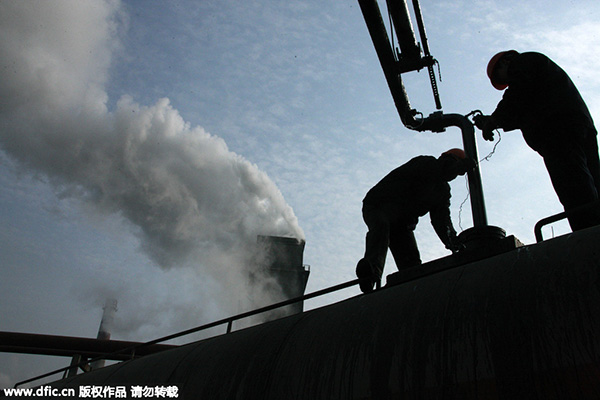China puts $6 trillion price tag on its climate plan
Updated: 2015-06-24 10:19
(Agencies)
|
|||||||||||
 |
|
Smoke is discharged from chimneys at a plant in Huaibei city, East China's Anhui province, Aug 14, 2013. [Photo/IC] |
Xie Zhenhua, special representative for climate change affairs at China's National Development and Reform Commission, said the objectives China will outline by the end of June will be "quite ambitious".
Xie was participating in a three-day Strategic and Economic Dialogue forum in Washington where he met with counterparts in the Obama administration, including US climate negotiator Todd Stern, Environmental Protection Agency Administrator Gina McCarthy and Energy Secretary Ernest Moniz.
To meet its objectives, China, the world's biggest greenhouse gas emitter, must reconfigure its coal-dependent energy mix and develop new energy sources, Xie said.
"We will need to carry out international cooperation and research and development to reduce the costs of relevant technologies and to innovate so that we can reach our objectives," he told reporters at a State Department briefing.
The United States and China announced on Monday they will partner on two new carbon-capture, utilization and storage projects to help commercialize the technology.
While key details of China's plan are not yet known, it is expected to include targets announced in November, when it reached a key climate change deal with Washington to cap its emissions by 2030 and fill 20 percent of its energy needs from zero-carbon sources.
Earlier this month, Chinese Premier Li Keqiang reaffirmed the government's commitment to hit a carbon emissions peak by "around 2030". The country's coal consumption decreased for the first time in years in 2014, however, leading some to speculate that its emissions could reach their peak sooner.
Stern, the US climate change envoy, told reporters the plans China has already announced with Washington were "a quite strong contribution".
But he said he hopes a final agreement of all countries at this December's key UN climate change conference in Paris contains "a strong set of...contributions, which are updated periodically" to ensure more ambitious targets.
Stern said China does not expect public finance to support its climate goals and that it is likely to attract investment as it adopts new technologies.
Earlier on Tuesday, Chinese Vice Premier Wang Yang told a panel moderated by former US Treasury Secretary Hank Paulson that 750,000 electric vehicles were sold in China last year, three times more than the year before, "giving great opportunities and profit to companies like Tesla and BYD (Auto) ".
"To tackle climate change is both a challenge and an opportunity," Wang said.
Ahead of the UN's climate change conference in Paris, countries are required to submit national plans, which will serve as the building blocks of a final agreement.
So far, 11 countries, including the United States and Mexico, as well as the European Union have submitted theirs.
Related Stories
China emissions could peak 5 years earlier than expected 2015-06-12 08:59
Greenhouse gases predicted to peak earlier than pledged 2015-06-09 11:28
Carbon market may expand by next year 2015-06-16 08:34
Climate's right to grow pro-environment financing for sound growth 2015-06-01 08:35
Bilateral agreement most welcome news of last year 2015-01-18 20:15
Today's Top News
NSA eavesdropped on last three French presidents
BOC denies illegal activity in Italy
Senior CPC official to attend China-Russia media forum
British queen arrives in Germany on state visit
Chinese premier to attend China-EU leaders' meeting
Ministers unable to reach deal on Greece, but door is still open
Polish airline, hit by cyber attack, says all carriers are at risk
Paris 4th entering race for 2024 Olympics
Hot Topics
Lunar probe , China growth forecasts, Emission rules get tougher, China seen through 'colored lens', International board,
Editor's Picks

|

|

|

|

|

|






